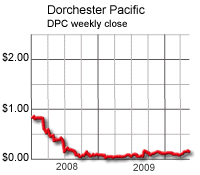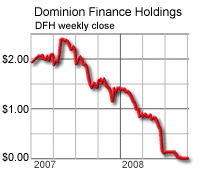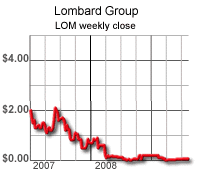 In the first phase of New Zealand's finance company credit crunch receiverships were the default option. Between May 2006 and October 2007 there were 12 finance companies put almost immediately into receivership when it became clear to the trustees that they had run out of cash to repay debentures and meet interest payments. As can be seen here in our "Deep Freeze" list National Finance 2000, Western Bay Finance, Bridgecorp, Nathans Finance, Propertyfinance securities, LDC Finance and Clegg and Co were all put into receivership. Then in October 2007 one of the trustees, Covenant, tried something different. Covenant agreed to a "moratorium" on debt repayments for consumer financiers Beneficial Finance and Geneva Finance that gave them time to sell assets or reorganise loan books before proposing a recapitalisation and delayed repayment plan.
In the first phase of New Zealand's finance company credit crunch receiverships were the default option. Between May 2006 and October 2007 there were 12 finance companies put almost immediately into receivership when it became clear to the trustees that they had run out of cash to repay debentures and meet interest payments. As can be seen here in our "Deep Freeze" list National Finance 2000, Western Bay Finance, Bridgecorp, Nathans Finance, Propertyfinance securities, LDC Finance and Clegg and Co were all put into receivership. Then in October 2007 one of the trustees, Covenant, tried something different. Covenant agreed to a "moratorium" on debt repayments for consumer financiers Beneficial Finance and Geneva Finance that gave them time to sell assets or reorganise loan books before proposing a recapitalisation and delayed repayment plan.
The idea was this avoided a "fire sale" that unnecessarily depressed sale prices and imposed the extra costs of employing a receiver and all the consultants around that. The fear was debenture holders (and certainly shareholders) would be worse off under a receivership than an orderly winding down of the loan book and repayment to investors.  They didn't have to look far for evidence that a receivership seemed disastrous. The early assessments of the returns under receivership from Bridgecorp were as little at 13 cents in the dollar. Five Star Consumer Finance's receivers estimated as little as 20 cents in the dollar. The first companies to go down the moratorium and restructure route were two consumer finance companies, Beneficial Finance and Geneva Finance. The argument they made, which seemed sensible at the time, was that their customers were still repaying their loans and making interest payments and therefore a loan book could be run down and investors repaid in an orderly fashion. Investors agreed to these moratoriums and they have kept trading. Then the property development financiers thought this looked like a good idea too. Many of the finance companies in trouble had lent to property developers, almost always with capitalising loans where no interest is paid until the project is complete or refinanced. Many of their projects were only partially completed and those that were simply not selling. Urgent mortgagee sales in the current climate would yield virtually nothing, the finance companies argued. Their trustees began agreeing.
They didn't have to look far for evidence that a receivership seemed disastrous. The early assessments of the returns under receivership from Bridgecorp were as little at 13 cents in the dollar. Five Star Consumer Finance's receivers estimated as little as 20 cents in the dollar. The first companies to go down the moratorium and restructure route were two consumer finance companies, Beneficial Finance and Geneva Finance. The argument they made, which seemed sensible at the time, was that their customers were still repaying their loans and making interest payments and therefore a loan book could be run down and investors repaid in an orderly fashion. Investors agreed to these moratoriums and they have kept trading. Then the property development financiers thought this looked like a good idea too. Many of the finance companies in trouble had lent to property developers, almost always with capitalising loans where no interest is paid until the project is complete or refinanced. Many of their projects were only partially completed and those that were simply not selling. Urgent mortgagee sales in the current climate would yield virtually nothing, the finance companies argued. Their trustees began agreeing.  MFS Finance asked for and got a moratorium. Since then, St Laurence, Dominion Finance, North South Finance, Dorchester Pacific, Hanover Finance, United Finance and Strategic Finance have frozen investments and started working on moratorium and rescheduled repayment plans. Some are still paying interest. All through this process the existing management remain in charge and they keep working with their trustees and bankers, if they have any. The underlying assumption with these property development finance companies is that the property market is frozen because of the extraordinary financial strife caused by the international credit crunch. They assume things will get back to normal as soon as the banks reopen their lending taps and the market can get back on its merry way. They assume that when the market resumes they will be able to sell their resort developments, apartments and villas for prices similar to the ones budgeted for by the developers when they bought the land, borrowed the money and built the projects. Or that even if the prices are a little bit lower, there was still enough fat in the projections for everyone to extract themselves without losses. They assume that this financial freeze will not last long and that the buyers will line up again to pay the prices budgeted for in the development plan. But will they? This is the question every debenture holder should ask themselves before they vote in favour of a moratorium which leaves the existing management in charge and chooses not to bring in the receivers. If they know the property market will recover to previous levels and quite quickly (say within 3-6 months) then that is a fair decision. If they don't know the market will recover then a vote for a moratorium is the biggest Hail Mary in the history of the New Zealand financial system. The 7 finance companies above are likely to propose moratoriums and repayment/capital restructure plans have NZ$1.5 billion tied up in their loan books. There are 45,170 account holders, although some investors will have more than one account in more than one finance company. If debenture investors believe, like I do, that the property market will take several years to recover and prices are likely to fall substantially (30% from their November 2007 peak by November 2009) in the meantime, I would recommend they vote for receivership. The quality of these loans should be tested on the market. If the loans and the projects are good then decent prices will be achieved. I fear though that many of the loans were bad and the projects are dead. The management of many of these companies are discredited. Avoid the Hail Mary. Vote for the receiver. As an interesting postscript, the two finance companies to go down the moratorium route are certainly not out of the woods. MFS Pacific investors now look like getting just 25 cents in the dollar back and Geneva Finance has just launched a review of its loan book because many of its consumer finance customers are struggling to repay their loans. It was also good to see Perpetual Trust also rejecting Dominion's first attempt at a moratorium. Perpetual, which is owned by Pyne Gould Corp, also rejected Lombard Finance's initial suggestions of a moratorium.
MFS Finance asked for and got a moratorium. Since then, St Laurence, Dominion Finance, North South Finance, Dorchester Pacific, Hanover Finance, United Finance and Strategic Finance have frozen investments and started working on moratorium and rescheduled repayment plans. Some are still paying interest. All through this process the existing management remain in charge and they keep working with their trustees and bankers, if they have any. The underlying assumption with these property development finance companies is that the property market is frozen because of the extraordinary financial strife caused by the international credit crunch. They assume things will get back to normal as soon as the banks reopen their lending taps and the market can get back on its merry way. They assume that when the market resumes they will be able to sell their resort developments, apartments and villas for prices similar to the ones budgeted for by the developers when they bought the land, borrowed the money and built the projects. Or that even if the prices are a little bit lower, there was still enough fat in the projections for everyone to extract themselves without losses. They assume that this financial freeze will not last long and that the buyers will line up again to pay the prices budgeted for in the development plan. But will they? This is the question every debenture holder should ask themselves before they vote in favour of a moratorium which leaves the existing management in charge and chooses not to bring in the receivers. If they know the property market will recover to previous levels and quite quickly (say within 3-6 months) then that is a fair decision. If they don't know the market will recover then a vote for a moratorium is the biggest Hail Mary in the history of the New Zealand financial system. The 7 finance companies above are likely to propose moratoriums and repayment/capital restructure plans have NZ$1.5 billion tied up in their loan books. There are 45,170 account holders, although some investors will have more than one account in more than one finance company. If debenture investors believe, like I do, that the property market will take several years to recover and prices are likely to fall substantially (30% from their November 2007 peak by November 2009) in the meantime, I would recommend they vote for receivership. The quality of these loans should be tested on the market. If the loans and the projects are good then decent prices will be achieved. I fear though that many of the loans were bad and the projects are dead. The management of many of these companies are discredited. Avoid the Hail Mary. Vote for the receiver. As an interesting postscript, the two finance companies to go down the moratorium route are certainly not out of the woods. MFS Pacific investors now look like getting just 25 cents in the dollar back and Geneva Finance has just launched a review of its loan book because many of its consumer finance customers are struggling to repay their loans. It was also good to see Perpetual Trust also rejecting Dominion's first attempt at a moratorium. Perpetual, which is owned by Pyne Gould Corp, also rejected Lombard Finance's initial suggestions of a moratorium.

We welcome your comments below. If you are not already registered, please register to comment
Remember we welcome robust, respectful and insightful debate. We don't welcome abusive or defamatory comments and will de-register those repeatedly making such comments. Our current comment policy is here.